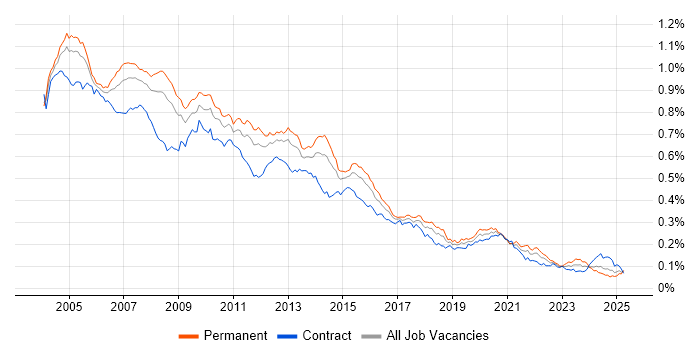Analyst Developer
UK
The median Analyst Developer salary in the UK is £44,323 per year, according to job vacancies posted during the 6 months leading to 18 May 2025.
The table below provides salary benchmarking and summary statistics, comparing them to the same period in the previous two years.
| 6 months to 18 May 2025 |
Same period 2024 | Same period 2023 | |
|---|---|---|---|
| Rank | 702 | 800 | 883 |
| Rank change year-on-year | +98 | +83 | +85 |
| Permanent jobs requiring an Analyst Developer | 27 | 83 | 78 |
| As % of all permanent jobs advertised in the UK | 0.048% | 0.083% | 0.079% |
| As % of the Job Titles category | 0.053% | 0.088% | 0.086% |
| Number of salaries quoted | 19 | 65 | 74 |
| 10th Percentile | £35,000 | £32,947 | £37,000 |
| 25th Percentile | £40,000 | £40,000 | £43,313 |
| Median annual salary (50th Percentile) | £44,323 | £51,000 | £52,550 |
| Median % change year-on-year | -13.09% | -2.95% | -8.61% |
| 75th Percentile | £71,875 | £60,000 | £78,438 |
| 90th Percentile | £90,900 | £93,250 | £86,750 |
| UK excluding London median annual salary | £40,000 | £45,000 | £50,000 |
| % change year-on-year | -11.11% | -10.00% | -4.76% |
All Permanent IT Job Vacancies
UK
For comparison with the information above, the following table provides summary statistics for all permanent IT job vacancies. Most job vacancies include a discernible job title that can be normalized. As such, the figures in the second row provide an indication of the number of permanent jobs in our overall sample.
| Permanent vacancies in the UK with a recognized job title | 50,837 | 94,491 | 90,806 |
| % of permanent jobs with a recognized job title | 90.77% | 94.69% | 91.50% |
| Number of salaries quoted | 27,317 | 67,546 | 57,366 |
| 10th Percentile | £29,500 | £28,500 | £32,500 |
| 25th Percentile | £41,250 | £38,500 | £45,000 |
| Median annual salary (50th Percentile) | £56,000 | £52,500 | £60,000 |
| Median % change year-on-year | +6.67% | -12.50% | - |
| 75th Percentile | £73,886 | £71,000 | £80,000 |
| 90th Percentile | £96,250 | £90,000 | £100,000 |
| UK excluding London median annual salary | £51,645 | £50,000 | £53,000 |
| % change year-on-year | +3.29% | -5.66% | +6.00% |
Analyst Developer
Job Vacancy Trend
Job postings that featured Analyst Developer in the job title as a proportion of all IT jobs advertised.

Analyst Developer
Salary Trend
3-month moving average salary quoted in jobs citing Analyst Developer.
Analyst Developer
Salary Histogram
Salary distribution for jobs citing Analyst Developer over the 6 months to 18 May 2025.
Analyst Developer
Top 9 Job Locations
The table below looks at the demand and provides a guide to the median salaries quoted in IT jobs citing Analyst Developer within the UK over the 6 months to 18 May 2025. The 'Rank Change' column provides an indication of the change in demand within each location based on the same 6 month period last year.
| Location | Rank Change on Same Period Last Year |
Matching Permanent IT Job Ads |
Median Salary Past 6 Months |
Median Salary % Change on Same Period Last Year |
Live Jobs |
|---|---|---|---|---|---|
| England | +98 | 27 | £44,323 | -15.58% | 14 |
| Work from Home | +122 | 15 | £43,500 | -9.45% | 10 |
| London | +108 | 15 | £85,000 | +8.63% | 9 |
| UK excluding London | +137 | 11 | £40,000 | -11.11% | 7 |
| South West | +110 | 6 | £40,000 | -23.81% | |
| South East | +91 | 3 | £44,323 | -29.65% | 5 |
| Midlands | +62 | 1 | £60,000 | +33.35% | |
| West Midlands | +46 | 1 | £60,000 | +33.35% | |
| East of England | +29 | 1 | £43,500 | -9.45% | 1 |
Analyst Developer Skill Set
Top 30 Co-occurring Skills and Capabilities
For the 6 months to 18 May 2025, Analyst Developer job roles required the following skills and capabilities in order of popularity. The figures indicate the absolute number co-occurrences and as a proportion of all permanent job ads featuring Analyst Developer in the job title.
|
|
Analyst Developer Skill Set
Co-occurring Skills and Capabilities by Category
The follow tables expand on the table above by listing co-occurrences grouped by category. The same employment type, locality and period is covered with up to 20 co-occurrences shown in each of the following categories:
